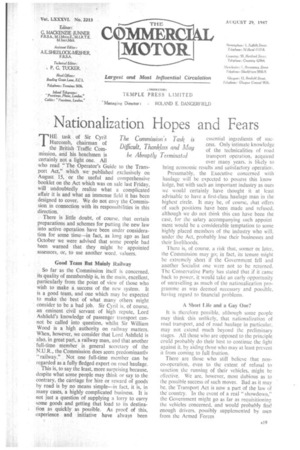Nationalization Hopes and Fears
Page 21

If you've noticed an error in this article please click here to report it so we can fix it.
THE task of Sir Cyril Hurcomb, chairman of the British Traffic Commission, and his henchmen is certainly not a light one. All who read "The Operator's Guide to the Transport Act," which wepublished exclusively on August 15, or the useful and comprehensive booklet on the Act which was on sale last Friday, will undoubtedly realize what a complicated affair it is and what an immense field it has been designed to cover. We do not env the Commission in connection with its responsibilities in this direction. .
There is little doubt, of course, that certain preparations and schemes for putting the new law into active• operation have been under consideration for some time—in fact, as long ago as last October we were advised that some people had been warned that they might be appointed assessors, or, to use another word. valuers.
Good Team But Mainly Railway So far as the Commission itself is concerned, its quality of membership is, in the main, excellent, particularly from the point of view of those who wish to make a. success of the new system. It is a good team, and one which may be expected to make the best of what many others might consider to be a bad job. Sir Cyril is, of course, an eminent civil servant of high repute, Lord Ashfield's knowledge of passenger transport cannot be called into question, whilst Sir William Wood is a high authority on railway matters. When, however, we consider that Lord Ashfield is also, in great part, a railway man, and that another full-time member is general secretary of the N.U.R., the Commission does seem predominantly " railway." Not one full-time member can be regarded as a fully fledged expert on road haulage.
This is, to say the least, more surprising because, despite what some people may think or say to the contrary, the carriage for hire or reward of goods by road is by no means simple--in fact, it is, in many cases, a highly complicated business. It is not just a question of supplying a lorry to carry some goods and getting that load to its destination as quickly as possible. As proof of this, experience and initiative have always been essential ingredients of success. Only intimate knowledge of the technicalities of road transport operation, acquired over many years, is likely to bring economic results and satisfactory operation.
Presumably, the Executive concerned with haulage will be expected to possess this know ledge, but with such an important industry as ours we would certainly have thought it at least advisable to have a first-class haulage man in the highest circle. It may be, of course, that offers of such positions have been made and refused, -although we do not think this can have been the case, for the salary accompanying such appoint ment would be a considerable temptation to some highly placed members of the industry who will. under the Act, probably. lose their businesses and their livelihoods.
There is, of course, a risk that, sooner ot later, the Commission may go; in fact, its tenure might be extremely short if the Government fell and another Socialist one were not to be returned. The Conservative Party has stated that if it came back to power, it would take an early opportunity of unravelling as much of the nationalization programme as was deemed necessary and possible, having regard to financial problems.
A Short Life and a Cay One?
It is therefore possible, although some people may think this unlikely, that nationalization of road transport, and of road haulage in particular, may not extend much beyond the preliminary stages. All those who are opposed to the principle. could probably do their best to continue the fight. against it, by aiding those who may at least prevent it from coming to full fruition.
There are those who still believe that nonco-operation, even to the extent of refusal to sanction the running of their vehicles, might be effective. We are, however, most dubious as to the possible success of such moves. Bad as it may be, the Transport Act is now a part of the law of the country. In the event of a real "showdown," the Government might go as far as requisitioning the vehicles concerned, and would probably find enough drivers, possibly supplemented by men from the Armed Forces












































































